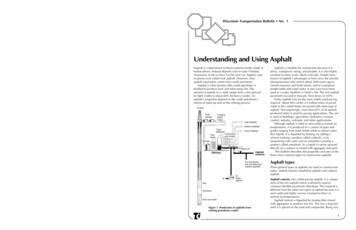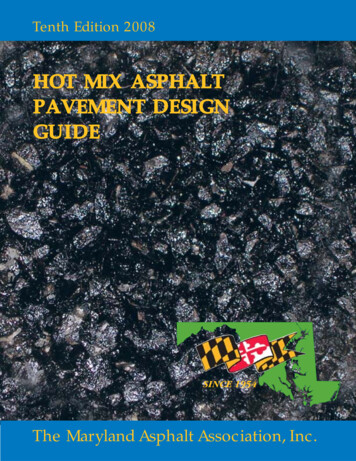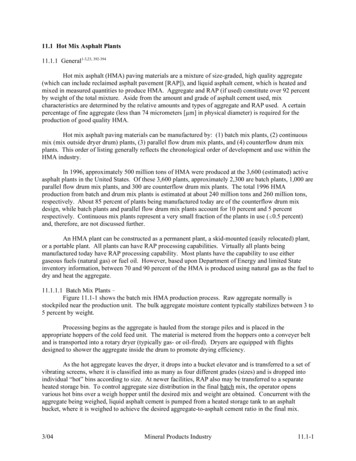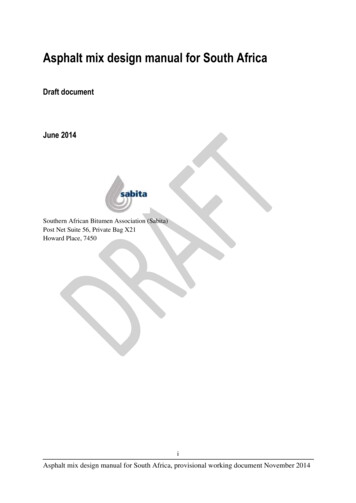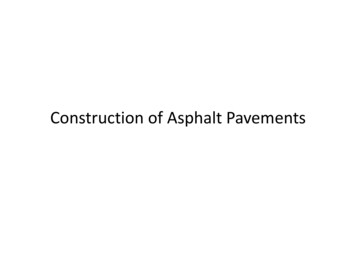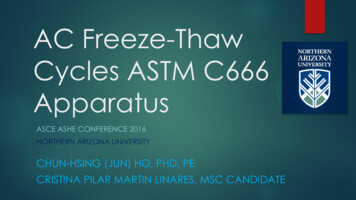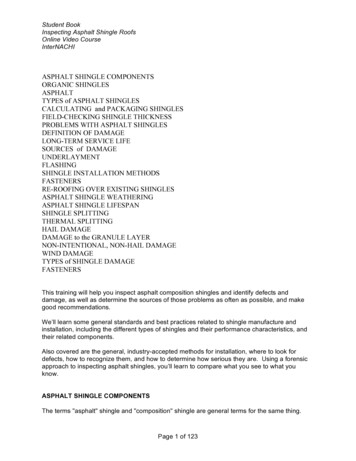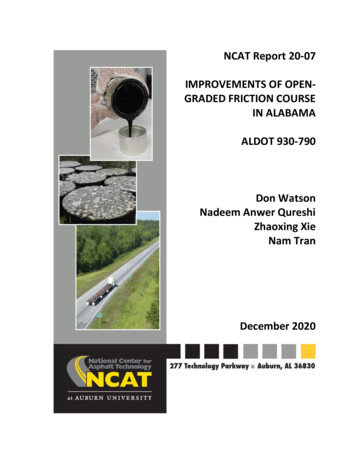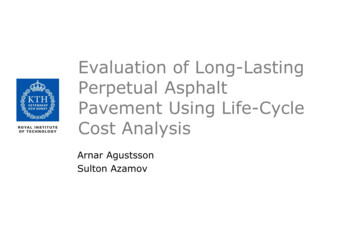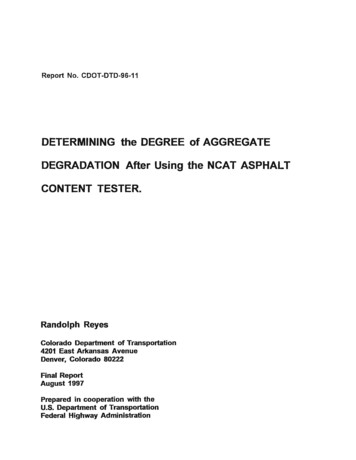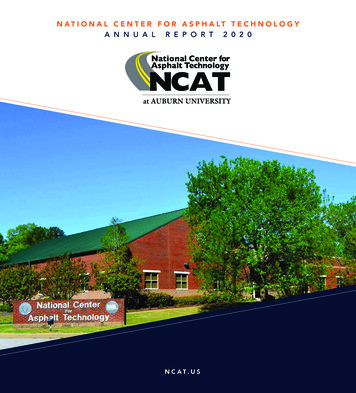
Transcription
N AT I O N A L C E N T E R F O R A S P H A LT T E C H N O L O G YA N N U A L R E P O R T 2 0 2 0N C AT. U S2020 Annual Report1
ANNUAL REPORT 2020October 1, 2019 —September 30, 2020NCAT277 Technology ParkwayAuburn, AL 36830334.844.6228DIRECTORRandy WestCOMMUNICATIONSAND MARKETINGChristine HallCONTENTSDirector’s Message3Core Commitments4Strategic Plan5Research Driven6Cracking Group Pays Off10CAPRI Consortium1112War Eagle RoadNTPEP Testing13Student Focus 14 2020 National Center forAsphalt Technology at AuburnUniversity.Auburn University is an equalopportunity educationalinstitution/employer.Training The Workforce15Notable Achievements16Communications Reach18
DIRECTOR’S MESSAGEThis annual report would ordinarily reflect onour advancements and growth, but this is notan ordinary year. The past year has broughtchallenges, change and a deeply renewedcommitment to our mission throughout NCATand across Auburn University. Although we arecontinuing to conduct innovative research ledby exceptional researchers and operational staff,there has been an impact on our operations andfinances due to the COVID-19 pandemic.As a research and training center focused onthe practical, we continually push ourselves tobe creative in outreach and education and todiscover new ways to produce findings that makea difference. We completed a comprehensivestrategic planning effort and now, with COVID-19,we continue to explore new ways to share findingswith stakeholders. Webinars and virtual trainingwill be a significant focus moving forward.Working from home became the norm for severalmembers of our team — about a quarter of ourstaff made this an effective way to be productiveand safe. Test Track and lab operations wereslowed during the spring as numerous employeesmissed a few days of work out of an abundanceof caution. However, we have followed guidelinesfrom the university’s leadership and health expertsand have limited the impact of the virus so far.As the pandemic and its impacts continuouslyevolve, there have been swings in uncertaintyand optimism. Over the course of 34 years, wehave weathered many challenging moments. I amproud and inspired by the way NCAT has risento this challenge and am convinced that we willovercome this one too.Through these challenging times, our primarygoal is to ensure that NCAT remains distinct inits operational expertise and services to improvepavement performance — for the benefit of oursponsors, partners, collaborators and the travelingpublic.Randy C. West, Ph.D., P.E.NCAT Director and Research Professor2020 Annual Report3
CORE COMMITMENTSMISSIONVALUESNCAT’s mission is to provide innovative,relevant and implementable research,technology development and education thatadvances safe, durable and sustainable asphaltpavements.Provide for the well-being of team membersand visitors by ensuring a culture of safetyconsciousness through our attitude and actions.VISIONNCAT will maintain its prominence as a worldleader in asphalt pavement technology. Centralto all its functions will be NCAT’s historicpartnerships with NAPA, state transportationdepartments, the FHWA and all stakeholdersinvolved in the asphalt pavement industry.NCAT will continue to be recognized for thequality of its research, training, education andtechnology transfer. NCAT will ensure thequality of its programs through a careful focus ofits resources with emphasis in areas of nationaland economic need.4National Center for Asphalt TechnologyProvide an environment where all employees feelwelcomed into an NCAT family that respects ourdifferences and works together to accomplishthe task at hand, where members have our fullsupport and the value of the home family isrecognized.Conduct ourselves with integrity by acting withhonesty and fairness without compromising thetruth, cutting corners or adding intentional bias.Conduct and pursue deployable and valuableresearch and technical services that result inpositive change for agencies, innovation forindustry and an improved traveling experience forthe public.
STRATEGIC PLANOperational ExcellenceOutreach & EducationSTRATEGIC OBJECTIVE:Build NCAT’s reputation as themost operationally effective asphalt pavementresearch center, turning research dollars intoimplementable advances in asphalt pavements.STRATEGIC OBJECTIVE:Build NCAT’s education and trainingcapabilities to become the most knowledgeableand effective asphalt training center in the world. Strengthen the culture of safety Build and develop staff with diverse capabilitiesand expertise to support NCAT’s mission Seek and adapt to feedback and input fromstakeholders Continue to improve cost effectiveness andoutput of operations Maintain existing and develop new long-termtechnical capabilities and advantages Serve clients’ needs such that they will viewNCAT as essential for technical support Work closely with allies and partners to supportissues that benefit all organizations Assist all stakeholder organizations to implementhigh value research findings Expand training and outreach as an enhancedrevenue stream Deliver high quality training on the most neededtopics Adapt to the evolving training landscape tomeet the growing demand for mobile delivery Grow the Auburn pavements and materialsgraduate and certificate programsInnovation & InfluenceSTRATEGIC OBJECTIVE: Grow NCAT into the preeminent research center and technicaladvocate for the asphalt industry. Strengthen capabilities that differentiate NCAT from other asphalt research organizations Continue to build the NCAT Test Track’s reputation as the world’s best accelerated pavement testingfacility and proving ground for evaluating innovative technologies Develop CAPRI as a means to better prioritize research needs and facilitate implementation Identify emerging research needs and quickly mobilize resources to initiate tasks that will enable futuredevelopment and implementation Pursue commercialization revenue opportunities aligned with NCAT’s mission Collaborate with Auburn and external researchers as needed to expand research Raise the visibility of NCAT and strengthen the ability to compete for federally funded research throughthe Auburn Transportation Research Institute2020 Annual Report5
RESEARCH DRIVENSTRENGTH IN NUMBERS25NEW CONTRACTSAWARDED 40MILLION ACTIVECONTRACTSLARGEST NEW CONTRACTS 800,000National Academy of Sciences: Quality Assurance Aspects ofPerformance Related SpecificationsRandy West 261,133Iowa State University: Accelerated Performance Testing ofBiopolymer-Modified MixtureNam Tran 250,000National Academy of Sciences: Construction Guide Specificationsfor Cold Central Plant Recycling and Cold In-Place RecyclingBen Bowers 208,735Virginia Transportation Research Council:Impact of ProductionVariability on Balanced Mix DesignBen Bowers and Fan Yin6National Center for Asphalt Technology
NATIONWIDE IMPACTNCAT has partneredwith MnROAD, atest road ownedand operated by theMinnesota Department ofTransportation, for parallelstudies in both northernand southern climates.Thirty state departmentsof transportation andthe Federal HighwayAdministration arecurrently engagedthrough MnROAD andNCAT research projects.PEER REVIEWEDSince 1995, our engineershave published over 300cutting-edge researchreports, NCHRP reportsand refereed journal andconference publicationarticles.2020 Annual Report7
AGING RESISTANT BINDER TECHNOLOGIESNCAT received a 700,000 research award in 2019 focusing on the development of agingresistant binder technology.This project is aimed at developing a newcategory of additives that inhibit the damagingeffects of asphalt binder oxidative aging thatleads to cracking and raveling of flexiblepavements.NCAT is working with Kraton, Michelin’sLehigh Technology, ChemCo Systems,Blacklidge Emulsions and Iowa State Universityto scientifically evaluate the technical andcommercial feasibility of five promisingtechnologies, including PolyRejuventor, HybridGTR, Epoxy Asphalt, UltraBinder and EpoxidizedBenzyl Soyate.8National Center for Asphalt TechnologyThe anticipated outcomes of the proposed studywill be two-fold. First, the research will expeditedevelopment of promising aging resistantadditives for asphalt binders and move thosetoward implementation; and second, the researchwill establish standardized methods for evaluatingfuture products aimed at providing similarbenefits.The ultimate potential impact of this researchwill be much longer service lives of asphaltpavements and therefore a substantial reductionin the cost of maintaining the nation’s pavementinfrastructure.
AUTONOMOUS FACILITYAuburn is building one of the nation’s few autonomous vehicle research facilities attached to atest track.For researchers in Auburn University’s GPS andVehicle Dynamics Laboratory (GAVLAB), preppingautonomous vehicles outside in Alabama’selements — from the sweltering summer sun topop-up thunderstorms — has become a neardaily occurrence. That is about to change withthe planned addition of a sophisticated newautonomous vehicle research facility at the NCATTest Track.The facility is expected to provide a garage withmultiple bays and lifts for commercial trucks andpassenger vehicles, office space for researchers,a conference room and an observation areaoverlooking NCAT’s 1.7-mile oval test track.The building is estimated to cost approximately 800,000 and will be one of the few autonomousresearch facilities in the nation attached to a testtrack.The GAVLAB has built a strong reputation inautonomous vehicle navigation and developed abroad sponsored research portfolio, with projectsranging from the Department of Defense and theFederal Highway Administration to many privateindustry partners. With various sponsors visitingeach month, the facility’s planned observationarea will provide a high-quality space todemonstrate its research.With a growing research thrust in transportationengineering, the autonomous research facilityalso demonstrates Auburn’s commitment tosupporting these research initiatives.2020 Annual Report9
CRACKINGGROUPPAYS OFFIn the mid 2000s, pavement engineersacross the United States recognized thatasphalt pavements were not performing toexpectations for durability. The Superpavesystem, implemented about 10 years earlierin most states, had effectively solved ruttingissues, but new pavements and overlayswere not performing well with regard tocracking and raveling.Highway agencies began exploring ways toincrease the asphalt contents of mixes bytweaking volumetric requirements, adjustingcompactive efforts and tightening downon policies related to aggregate testing. Atthe same time, a stronger push was beingmade to increase recycled asphalt materialscontents for economic and sustainabilityreasons. Some states began research withtheir local universities to develop new teststo identify mixtures that were prone topremature cracking.After another 10 years of these efforts, verylittle real progress was made. A variety ofnew cracking tests had been recommendedby researchers, but most of the tests had notbeen validated with field performance andthere was no consensus on which test (ortests) were suitable for day-to-day usage.In 2015, NCAT and MnROAD began apartnership to address national researchneeds that the two organizations wereuniquely suited to handle. One of thoseneeds was field validation experiments forthe cracking tests. NCAT would build testsections to focus on top-down, load-relatedcracking and MnROAD would focus onthermal cracking.Five years later, we are harvesting thefruits of that labor. NCAT has been sharingpreliminary results with industry stakeholderswho are interested in implementing BalancedMix Design. Selecting the best tests is thefirst major step toward improving pavementperformance and opening the door to awide range of innovations that could notbe adequately evaluated with Superpave.Highway agencies and asphalt mix producersare eager to put the Cracking Groupresearch findings into practice.10National Center for Asphalt Technology
CAPRICONSORTIUMThe Consortium for Asphalt Pavement Research and Implementation (CAPRI) will bring together all stakeholdersin the highway construction and maintenance industry working to improve asphalt pavement cost-effectiveness,sustainability and safety. Innovative technologies and practices are more successfully developed and implementedthrough collaboration among state DOTs, FHWA, contractors, materials suppliers and academia. To better foster thedevelopment of innovations, CAPRI will serve to identify national priority research and implementation needs fortomorrow’s asphalt pavements.Goals of the consortium are to develop asphalt pavement research needs, provide technical guidance on current andevolving asphalt materials specifications, select and fund small-scale studies to address knowledge gaps or explore newtopics and foster the implementation of useful research.Semi-annual meetings, rotated among participating organizations, will serve as a forum to facilitate knowledge sharing.Meetings will be organized into topics led by committees that focus on asphalt binders, asphalt mixtures, pavementdesign, construction, maintenance and rehabilitation, pavement-vehicle interaction and others as the need arises.CAPRI will operate as a consortium of flexible pavement stakeholders open to all state, local and federal highwayagencies, industry associations, companies, academic institutions and research organizations. Each participating entitymay appoint one voting representative to CAPRI. NCAT will manage administrative duties.The CAPRI executive committee will include balanced representation from major stakeholder groups serving withlimited terms. The committee will draft consortium by-laws and policies to be ratified by members, approve budgets,set meeting agendas and serve as the final authority to approve deliverables.All member organizations contribute to funding CAPRI. Highway agencies contribute through the Transportation PooledFund Program. Other stakeholder organizations can contribute 6,000 annually to CAPRI at Auburn University.2020 Annual Report11
WAR EAGLE ROADDrivers can now experience the first seven musical notesof Auburn’s fight song, “War Eagle” as they head towardcampus. The section of South Donahue Drive is dubbed“War Eagle Road” and is located on the northbound lanebetween Len Morrison Drive and West Sanford Avenue inAuburn, Alabama.necessary spacing on the roadway to make the right thefrequency of each note. An automobile driving acrossthese physical disruptions in the road can then recreate amusical tune via the vibrations, which can be heard in (andaround) the vehicle. Hearing the musical road is a bonus fortraveling the roadway safely at the posted speed limit.Rumble strips are anything but pleasant to the ear — butwith some reverse engineering, these vibrations can createdistinctive frequencies that simulate musical notes and, in asense, perform a musical composition.There are only a small number of musical roads aroundthe world, and two in America both used grooves in thepavement. Arnold wanted to develop an improved methodthat would fit the project’s requirements of strength anddurability while being safer, more durable, better soundingand, of course, non-destructive. Working with NCAT,Arnold tested DOT-approved marking tape affixed to thepavement surface on an auxiliary road at the Test Track.After determining that trial tape could work in the field, itwas tested under simulated traffic conditions. Acceleratedlaboratory friction testing equipment — developed atNCAT — was used to test two additional adhesive tapes.By utilizing materials intended to meet or surpass thecurrent standards of road markers, costs are kept low andproduction and installation of the musical road is simple andrepeatable.“The concept is really kind of complex and simple at thesame time,” said Auburn alumnus Tim Arnold, who hadthe idea to put America’s newest musical road on Auburn’scampus.In pure physics terms, sound is vibration going throughmatter, and a musical note is comprised of sound vibrationsat a particular frequency. A complete mathematical modelis used to determine the exact number of elements andWar Eagle Road is the first musical road with the surfaceapplication material, the first on a college campus and firstwith a fight song.12National Center for Asphalt Technology
NTPEPTESTINGThe National Transportation Product EvaluationProgram (NTPEP) is a national testing program hostedby the American Association of State Highway andTransportation Officials (AASHTO). This voluntary programwas established to minimize the duplication of effortsamong AASHTO member states by providing a processwhere manufacturers and suppliers submit products forindependent testing. The results are then shared withAASHTO member states for their own use in productapproval or product quality verification.NTPEP is truly a win-win cooperative partnership betweenstate DOTs and transportation industry participants.From a state’s perspective, NTPEP provides benefitsincluding cost savings from reduced testing and auditingresources, improved product quality acceptance, reliableindependent test results and shared expertise andexperience with other states. The benefits of NTPEPfor suppliers are also substantial because it provides anopportunity to have their products exposed to all AASHTOmember states at once, significantly shortening theproduct evaluation and approval process.NTPEP currently has 24 product evaluation programs, withone being warm mix asphalt (WMA) additives and anti-stripadditives (ASA). WMA and ASA are widely used asphalttechnologies that provide environmental and performancebenefits to asphalt paving mixtures. The objective of theWMA and ASA evaluation program is to compare mixescontaining various WMA and/or ASA technologies to hotmix asphalt control mixes using the same asphalt binderand aggregate to determine relative performance.NCAT was selected as the testing laboratory for NTPEP’sWMA and ASA program in 2019. NCAT has completed theevaluation of eight products to date, including four WMAadditives, three ASA additives and one WMA plus ASAcombined additive.NTPEP and NCAT have agreed to open three productsubmission cycles for 2020. The first cycle openedFebruary 6, 2020 and closed February 28. Four WMAand ASA products were received. Testing at NCAT willcommence in early April with an anticipated completiondate of July 31, 2020. The other two submission cycles willopen on June 1 and October 1, 2020.2020 Annual Report13
STUDENT FOCUSNATIONAL RANKINGS(SAMUEL GINN COLLEGE OF ENGINEERING)2940thrd23thUndergraduate program rankingamong public universities1Auburn Engineering offers 13 undergraduatedegrees across 10 engineering disciplines as wellas a host of graduate programs.Graduate program ranking amongpublic universities1Ranked 12th1 in Best Online EngineeringPrograms, our online Master of Civil Engineeringwith an emphasis in pavements and materialscombines traditional instruction with moderndelivery methods to offer graduate degreesbeyond Auburn’s campus.Graduate online program rankingamong all engineering colleges1U.S. News & World Report, 20191GRADUATE SNAPSHOT(NCAT)Our exceptional studentsare trained on the mostup-to-date technologiesand graduate preparedto apply their skillsto various industries.Since 1989, NCAT hasdeveloped 101 graduatestudents with a combinedtotal of 73 master’s and31 doctoral degrees.14Employment by IndustryNational Center for Asphalt Technology
TRAINING THE WORKFORCENCAT’s training program includes asphalt technician certification programs for multiple highwayagencies, a range of courses for the asphalt industry and specialized workshops conductedwithin the United States and abroad.51FACE-TO-FACECOURSES877ATTENDEESBALANCED MIX DESIGNThe National Asphalt PavementAssociation sponsored regionalBalanced Mix Design workshopsdesigned for state highway agencymaterials engineers who are typicallydecision makers on mix design andacceptance specifications, asphaltindustry mangers responsible forasphalt mix designs and qualitycontrol testing and other stakeholdersinterested in gaining an understandingof Balanced Mix Design. The workshopswere conducted by NCAT DirectorRandy West and Assistant ResearchProfessor Fan Yin.PRESENTATIONS AND WEBINARSNCAT has successfully transitioned many of our presentationsto live and prerecorded webinars. In the first of its kind, NCAThosted a free webinar in Spanish, Sustainable Materials inAsphalt Pavement Practices. Topics of this event were the designof RAP asphalt mixtures, recycled tire rubber in asphalt mixtures,preservation techniques in asphalt pavements and workshopsand courses for Latin America. The webinar was well receivedwith over 370 registrations for the live event.Since the pandemic spreadworldwide in mid March, NCATresearchers have conducted114 webinars and onlinepresentations2 to a globalaudience.April 1, 2020 - September 30, 2020.22020 Annual Report15
NOTABLE ACHIEVEMENTSRaquel MoraesPuchalski was hired asan assistant researchprofessor. She hasbeen a postdoctoralresearcher at NCATsince August 2017.Karol Kowalski, associateprofessor and vice director ofthe Roads and Bridges Instituteat the Warsaw Universityof Technology, spent sixmonths at NCAT researchinginnovative technologies forsustainable road constructionas a Fulbright Scholar.16National Center for Asphalt TechnologyAdministrativeAssociate StacieHunter was recognizedas an Auburn UniversitySpirit of Excellencerecipient in November2019.
Assistant Research Engineer Nathan Mooresuccessfully passed the P.E. examination tobecome a licensed professional engineer in thestate of Alabama.Buzz Powell has been named NCAT associatedirector and research professor.AUBURNFIRST PLACE!Auburn Engineering students Mo Fortunatus, David Vivanco, DannyMartinez, Zachary Pace and Madison Eason were announced winners ofthe CRH Americas Asphalt Mix Design Competition. As the first place team,the five members will split a 7,500 scholarship award.2020 Annual Report17
COMMUNICATIONS REACHWEBSITE TRAFFICUnique Pageviews By TopicOUR RESEARCHABOUT NCATEDUCATIONAND TRAININGTEST TRACKHOME PAGEPAVEMENTPRESERVATIONTOP VISITORS BY COUNTRYUNITED STATES18,425CHINA2,155INDIA1,03418National Center for Asphalt TechnologyJAPAN991CANADA706
SOCIAL MEDIATOTAL FOLLOWERS326826991045786OWNED MEDIA7,798GROWTH RATE33.5%Newsletter DistributionNCAT’s bi-annual newsletter,Asphalt Technology News,contains ready-to-useinformation, covers timelytopics and includes a forumfor industry personnel.EXTERNAL MEDIANCAT was mentioned in a totalof 64 local, regional, national,international and trade newsoutlets across print and digitalplatforms.Media ERSUNIVERSITY/COLLEGEPUBLICATIONS2020 Annual Report19
NONPROFIT ORG.U.S. POSTAGEPAIDPERMIT NO. 9AUBURN, AL 368301161 W. Samford Ave.Building 8Auburn, AL 36849A N N U A LR E P O R T2 0 2 0National Center for Asphalt Technology at Auburn University277 Technology Parkway, Auburn, Alabama 36830334-844-6228 ncat.us20National Center for Asphalt Technology
4 National Center for Asphalt Technology. MISSION. VISION. VALUES. NCAT's mission is to provide innovative, relevant and implementable research, technology development and education that advances safe, durable and sustainable asphalt pavements. NCAT will maintain its prominence as a world leader in asphalt pavement technology. Central

